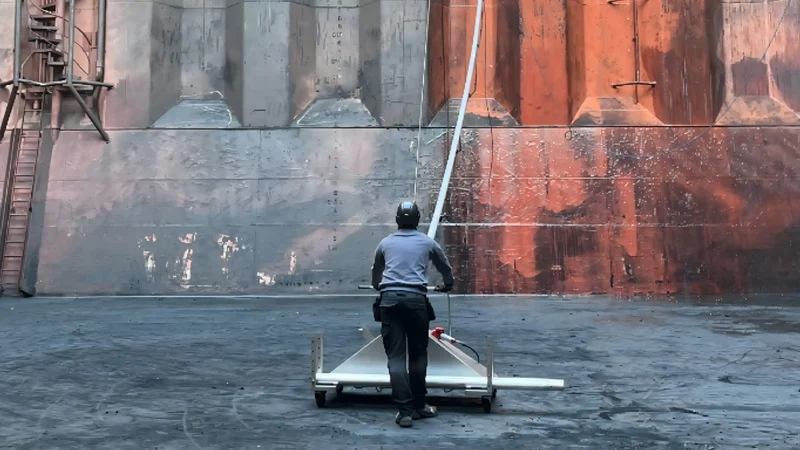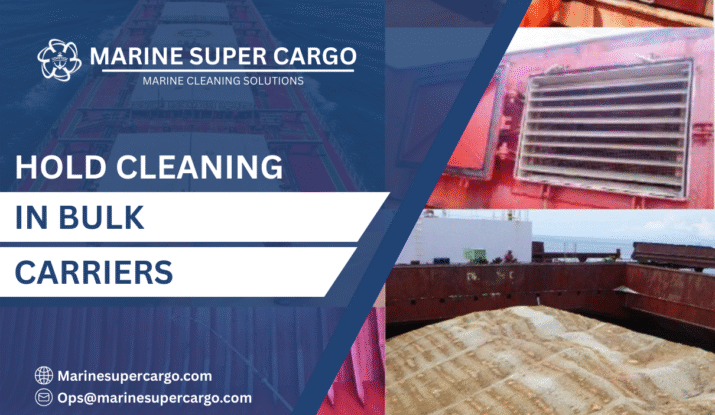Hold cleaning in bulk carriers represents one of the most critical operational procedures in modern maritime cargo transportation. The cargo holds aboard bulk carriers serve as the primary storage compartments for various dry bulk commodities, from grain and coal to iron ore and fertilizers. Without proper hold cleaning in bulk carriers, vessels face significant risks including cargo contamination, structural damage, and regulatory violations.
Marine Super Cargo, a leading provider of marine cargo services, emphasizes that hold cleaning in bulk carriers directly impacts vessel performance, cargo quality, and operational profitability. The importance of hold cleaning in bulk carriers extends beyond basic maintenance, encompassing safety protocols, environmental compliance, and cargo integrity standards.
Effective hold cleaning in bulk carriers requires specialized equipment, trained personnel, and adherence to international maritime standards. Hold cleaning in bulk carriers The process involves removing cargo residues from the forward holds to the aft compartments, ensuring every surface from the tank top to the hatch coamings meets cleanliness specifications.
Why Hold Cleaning Matters in Bulk Carrier Operations
Cargo Contamination Prevention
Cargo contamination represents the primary concern driving rigorous hold cleaning in bulk carriers. Residual materials from previous voyages can compromise subsequent cargo loads, leading to significant financial losses. For instance, coal dust remaining in holds can contaminate grain shipments, making them unsuitable for human consumption.
The port and starboard holds must be thoroughly cleaned to prevent cross-contamination between different cargo types. Professional cleaning ensures that organic materials like grain don’t mix with industrial commodities such as fertilizers or chemicals.
Structural Integrity Maintenance
Hold cleaning in bulk carriers plays a vital role in maintaining vessel structural integrity. Accumulated cargo residues, particularly corrosive materials, can accelerate steel deterioration in cargo compartments. Salt-laden cargoes and chemical fertilizers are particularly damaging to hold structures.
Regular cleaning prevents the buildup of materials that can cause accelerated corrosion in the forward and aft sections of cargo holds. This proactive approach extends vessel lifespan and reduces costly repairs during dry-dock periods.
Regulatory Compliance Requirements
International maritime regulations mandate specific cleanliness standards for bulk carriers. The International Maritime Organization (IMO) and various port authorities enforce strict hold cleaning standards, particularly for vessels carrying food-grade commodities.
Non-compliance with hold cleaning requirements can result in cargo rejection, vessel detention, and substantial penalties. Port state control inspections frequently focus on hold cleanliness, making proper cleaning procedures essential for smooth port operations.

Best Practices for Effective Hold Cleaning
Pre-Cleaning Assessment
Before commencing hold cleaning operations, crew members must conduct thorough inspections of all cargo compartments. This assessment identifies areas requiring special attention, particularly around the bilge wells, tank tops, and hatch coaming areas.
The inspection should cover both port and starboard sides of each hold, documenting any structural damage or areas of concern. Hold cleaning in bulk carriers Proper documentation ensures accountability and helps track cleaning effectiveness over time.
Systematic Cleaning Approach
Effective hold cleaning follows a systematic approach, starting from the upper levels and working downward. This method prevents recontamination of previously cleaned surfaces and ensures thorough removal of all residues.
The cleaning process typically begins at the hatch coamings and progresses through the upper ‘tween decks before addressing the main hold areas. Each compartment requires individual attention to ensure complete cleanliness.
Equipment and Personnel Requirements
Modern hold cleaning operations require specialized equipment including high-pressure water systems, industrial vacuum units, and appropriate personal protective equipment. Hold cleaning in bulk carriers Trained personnel familiar with bulk carrier construction and cargo handling procedures are essential for safe, effective cleaning.
Marine Super Cargo utilizes state-of-the-art cleaning equipment and employs certified professionals who understand the unique requirements of different cargo types and vessel configurations.
Environmental Considerations
Waste Water Management
Hold cleaning operations generate significant quantities of waste water containing cargo residues. Proper waste water management ensures compliance with international pollution prevention regulations, particularly MARPOL requirements.
Modern bulk carriers incorporate waste water treatment systems to process cleaning runoff before discharge. Hold cleaning in bulk carriers Shore-based facilities may also provide waste water reception services in environmentally sensitive areas.
Chemical Usage Protocols
Some cargo types require specialized cleaning chemicals to ensure complete residue removal. Hold cleaning in bulk carriers The selection and application of cleaning agents must consider environmental impact, crew safety, and effectiveness against specific contaminants.
Biodegradable cleaning agents are increasingly preferred for their reduced environmental impact while maintaining cleaning effectiveness across various cargo residue types.
Technology Advancements in Hold Cleaning
Automated Cleaning Systems
Recent technological developments have introduced automated cleaning systems for bulk carrier holds. These systems provide consistent cleaning quality while reducing manual labor requirements and improving safety outcomes.
Robotic cleaning systems can access difficult areas within cargo holds, ensuring comprehensive cleaning coverage from bow to stern compartments.
Digital Monitoring Solutions
Digital documentation systems now track cleaning procedures, providing real-time monitoring of cleaning progress and quality standards. These systems generate detailed reports for regulatory compliance and operational optimization.
Advanced sensors can detect residue levels and verify cleaning completion, reducing the risk of cargo contamination and regulatory violations.
Economic Impact of Proper Hold Cleaning
Operational Efficiency
Well-maintained, properly cleaned holds improve cargo loading and discharge operations. Clean surfaces facilitate smoother cargo flow, reducing port time and associated costs.
Efficient hold cleaning procedures minimize vessel downtime between voyages, maximizing revenue potential and operational profitability.
Insurance and Liability Benefits
Proper hold cleaning documentation provides protection against cargo damage claims and insurance disputes. Comprehensive cleaning records demonstrate due diligence in cargo care and handling procedures.
Professional cleaning services help vessel operators maintain favorable insurance terms and reduce liability exposure related to cargo quality issues.
Conclusion
The importance of hold cleaning in bulk carriers cannot be overstated in today’s competitive maritime industry. From preventing cargo contamination to ensuring regulatory compliance, proper cleaning procedures form the foundation of successful bulk carrier operations.
Marine Super Cargo remains committed to supporting vessel operators with comprehensive hold cleaning solutions that meet international standards while optimizing operational efficiency. Investment in proper cleaning procedures delivers long-term benefits through improved cargo quality, reduced maintenance costs, and enhanced regulatory compliance.
As the maritime industry continues evolving, hold cleaning standards will likely become more stringent, making professional cleaning services increasingly valuable for bulk carrier operators worldwide.
Frequently Asked Questions
1. How often should bulk carrier holds be cleaned?
Hold cleaning frequency depends on cargo types and voyage schedules. Generally, holds require cleaning between different cargo types, especially when switching from industrial to food-grade commodities. Regular cleaning schedules help maintain optimal hold conditions.
2. What are the main challenges in bulk carrier hold cleaning?
Key challenges include accessing all hold areas, managing waste water disposal, ensuring complete residue removal, and maintaining cleaning schedules without disrupting voyage timetables. Professional cleaning services help address these challenges effectively.
3. How long does complete hold cleaning typically take?
Complete hold cleaning duration varies based on vessel size, cargo type, and contamination levels. Standard cleaning operations typically require 12-24 hours per hold, while heavy contamination may extend cleaning time significantly.
4. What safety measures are required during hold cleaning operations?
Safety measures include proper ventilation, personal protective equipment, confined space entry procedures, and toxic gas monitoring. All personnel must be trained in safe cleaning practices and emergency response procedures.
5. How does hold cleaning impact cargo insurance coverage?
Proper hold cleaning documentation supports cargo insurance claims and demonstrates due diligence in cargo care. Insurance companies often require evidence of adequate cleaning procedures, making professional documentation essential for coverage protection.


